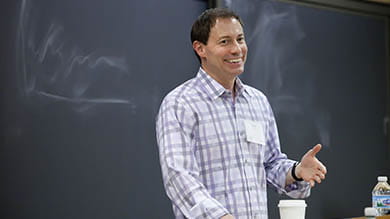True detectives
Uncovering insights on putting marketing theory into practice
Evoking Sir Arthur Conan Doyle, Donald Lehmann of Columbia Business School shared that reflection at the conclusion of the 2014 Theory + Practice in Marketing conference held at Kellogg. Lehmann’s remarks illustrated how practitioners and academics alike are in constant pursuit of discoveries that have the potential to solve huge problems, such as the challenges posed by big data.
“While data analytics is one of the big ‘it’ ideas of the current day, why does it matter? We all know it’s about gaining a deeper understanding of the customer and how you create more value,” said Dean Sally Blount ’92 as she welcomed top marketing faculty from across the globe to the fourth annual TPM conference.
Speakers who have held top positions at Google, Microsoft and Booz Allen imparted the following ways today’s executives can harness the power of big data — by emulating the wisdom of Sherlock Holmes.
1. Become a professional skeptic
“My education here taught me how to be a professional skeptic as opposed to an armchair skeptic,” said former Booz & Company CEO Shumeet Banerji ’90, as he reflected on obtaining his PhD at Kellogg. “Being a professional skeptic is about asking, ‘Is that true?’ ‘Under what conditions is it true?’ ‘Can you support that claim with evidence?’ Good questions beget good answers. It is about not accepting something is thus because a wise man said so.”
2. Emphasize decision-making over analytic output
Speaking to his time in the corporate world, Banerji said, “While analysts do analytics, nobody listens to them. You have to get line people to use analysis. And the way you get them to do it is by integrating the analytics into decision-making. What matters is decision-making, what doesn’t matter is analytic output.”
3. Don’t buy the quick-fix “anxiety sell” — hire the right people instead
Instead of trying to find flash-in-the-pan big data solutions, Tony Fagan, who leads a quantitative research team at Google, underscored the importance of hiring a Watson-like team with the right combination of skills. “It’s almost a fluency issue. They need a certain intuition with data, they need to know what questions to ask and they need to have some understanding of technology, because that, in my view, is what will affect marketing organizations in the future.”
4. Experiment your way to rapid innovation
As the economics of technology professor at Stanford and the former chief economist at Microsoft, Susan Athey knows a thing or two about how research principles can best apply to modern business, especially in the area of web search and online advertising. “At Microsoft and Google, algorithmic changes [in web search] are proposed frequently and exposed to a subset of users in randomized experiments. Every single thing that changes at Microsoft and Google in search goes through A/B tests. Experimentation allows you to incredibly rapidly innovate. You can have people come up with an idea, put it through an experimentation process, test it and ship it within a week.”
Ideally, all of this tinkering will have a positive impact on key stakeholders. According to Athey, “When you think about changing a [web search] algorithm, it’s going to change the outcome for all constituents. It’s going to change revenue for the platform, it’s going to change advertiser profits and it’s going to change the user experience. You’re constantly monitoring how changes you make affect the welfare of participants.”
Conference conversations revealed the value of academics’ and practitioners’ shared focus on developing an analytical approach to customer centricity — and forging collaboration between the two sectors is truly a case worth cracking.

No comments:
Post a Comment